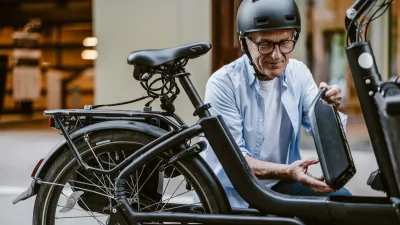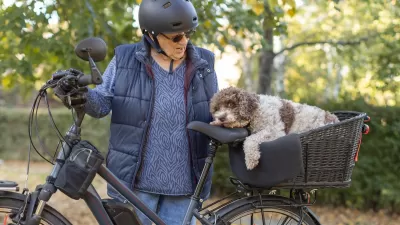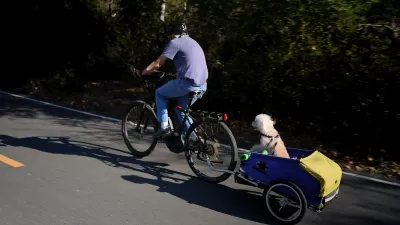Residents are taking advantage of the city’s rebate program, which offers discounts of up to $1,200 on e-bikes for low-income residents.

Writing in Westword, Conor McCormick-Cavanagh describes the success of Denver’s recent e-bike rebate program. Through the program, “Any resident could qualify for $400, and people with more limited incomes could get a $1,200 rebate. For those interested in cargo e-bikes, which have storage capacity that can handle even Costco runs, an additional $500 was available.”
The program was so popular that “By May 11, CASR had stopped accepting applications because it had already received 3,250 for a three-year program budgeted at $3 million for the first year.” But there’s hope for those who haven’t applied yet: “since fewer than 1,000 of those rebates have been paid out so far (they’re only good for two months), CASR will again accept applications starting July 11, with 2,000 available.”
According to the article, “CASR was particularly pleased with the high number of applications for the larger, income-based rebate. To qualify, applicants must show that they’re enrolled in some type of welfare assistance, like food stamps, or that they have a household income below 80 percent of the area median income.”
Colorado is a pioneer on the e-bike front, McCormick-Cavanagh writes. “In 2009, Colorado became one of the first states to define and legalize e-bikes. And then in 2017, the state further refined its classification system, which affects where e-bikes can be used.” The article features Denver residents who have purchased e-bikes using the city rebate, local bike shops who have benefited from the e-bike boom, as well as the author’s own quest to find their perfect e-bike. After the first ride, McCormick-Cavanagh writes, “I’m hooked.”
FULL STORY: Wheeling and Dealing: Denver's E-Bike Rebate Program Is on a Roll

Planetizen Federal Action Tracker
A weekly monitor of how Trump’s orders and actions are impacting planners and planning in America.

Maui's Vacation Rental Debate Turns Ugly
Verbal attacks, misinformation campaigns and fistfights plague a high-stakes debate to convert thousands of vacation rentals into long-term housing.

Cuomo Is the Candidate of Both NIMBYs and Developers. What Gives?
In the New York City mayoral race, odd bedfellows align to preserve the housing status quo.

The Subversive Car-Free Guide to Trump's Great American Road Trip
Car-free ways to access Chicagoland’s best tourist attractions.

San Antonio and Austin are Fusing Into one Massive Megaregion
The region spanning the two central Texas cities is growing fast, posing challenges for local infrastructure and water supplies.

Charlottesville Temporarily Has No Zoning Code
A judge ordered the Virginia city to throw out its newly revised zoning code, leaving permitting for new development in legal limbo.
Urban Design for Planners 1: Software Tools
This six-course series explores essential urban design concepts using open source software and equips planners with the tools they need to participate fully in the urban design process.
Planning for Universal Design
Learn the tools for implementing Universal Design in planning regulations.
Heyer Gruel & Associates PA
JM Goldson LLC
Custer County Colorado
City of Camden Redevelopment Agency
City of Astoria
Transportation Research & Education Center (TREC) at Portland State University
Jefferson Parish Government
Camden Redevelopment Agency
City of Claremont





























